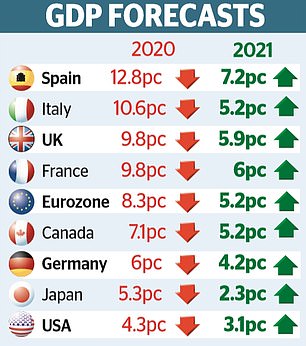Covid’s £ 21 trillion cost: IMF warns the pandemic will cause “ lasting damage ” to living standards around the world
The International Monetary Fund has warned that the Covid crisis will lead to a gap of 21 trillion pounds in the global economy and “permanent damage” to living standards.
After the total death toll from the epidemic rose to more than a million, the Washington-based agency yesterday explained the devastating global impact of the virus on the economy.
In its latest report on the outlook for the global economy, the International Monetary Fund predicted that the crisis would leave financial scars for years while the recovery would be “long, erratic and uncertain.”

Setbacks: Gita Gopinath, chief economist at the International Monetary Fund, said the crisis will leave scars and any recovery will be “ long, erratic and uncertain ”
It also forecasts the overall production loss caused by the pandemic to reach $ 28 trillion (£ 21 trillion) by the middle of the decade.
This is a bigger impact than the size of the US economy, the largest in the world.
This “represents a severe setback to the improvement in average living standards in all groups of countries,” said Gita Gopinath, chief economist at the International Monetary Fund.
“This crisis is likely to leave scars in the medium term because labor markets take time to heal, and investment is declining due to uncertainty, balance sheet problems and lost education, weakening human capital,” she added.
All countries are now facing what I would call The Long Ascent – a difficult climb that will be long, irregular and uncertain. And prone to setbacks.
The road ahead is filled with extraordinary uncertainty. Rapid advances in health measures, such as vaccines and treatments, can accelerate the ascent. But it could get worse, especially if there is a significant increase in severe disease outbreaks.
Despite all this, the International Monetary Fund has become marginally more optimistic since the summer, and it expects the global economy to contract by 4.4 percent this year.

The International Monetary Fund expects the total loss in output from the pandemic to reach $ 28 trillion (£ 21 trillion) by the middle of the decade.
This points to an improvement in the 5.2 percent contraction that you forecast in the latest WEO in June.
The upgrade reflects both that the recession in the second quarter was not as severe as previously feared, and that economies around the world have rebounded again more quickly than expected with the lockdown lifted.
The fund said even a 4.4% contraction would still be the worst global recession since the Great Depression of the 1930s.
The International Monetary Fund has also warned that the recovery will be slightly slower than previously thought, amid a spike in infections and a new wave of lockdowns and restrictions to slow the spread.
This sentiment was echoed by Andrew Bailey, Governor of the Bank of England, who told his colleagues on the Economic Affairs Committee in the House of Lords yesterday: “The difficult arenas are still ahead.”
Experts were surprised by the strength of the UK’s economic recovery as the national lockdown imposed in March was lifted.
But the introduction of local lockdowns and other restrictions to address a second wave of the virus has stoked fears that the recovery could end.
The International Monetary Fund raised its forecast for the United Kingdom slightly, and expected the economy to contract by 9.8 percent this year, like France.
This compared to the 10.2 percent decline expected in June. The UK is expected to lag behind the Eurozone, which is expected to contract by 8.3% this year.
Among the Group of Seven advanced economies, only Italy is expected to perform worse.
But the British economy is also expected to recover by 5.9 percent next year, faster than the euro area.
The International Monetary Fund confirmed that the global outlook would have become darker without “unprecedented financial, monetary and regulatory responses” to support the incomes of households and companies.
Gopinath said the steps taken “have helped save lives and livelihoods and helped prevent a financial catastrophe.”
But as governments contemplate how to deal with escalating Covid debt, they cautioned: “It is imperative that fiscal and monetary policy support is not withdrawn prematurely, in the best possible way.”







